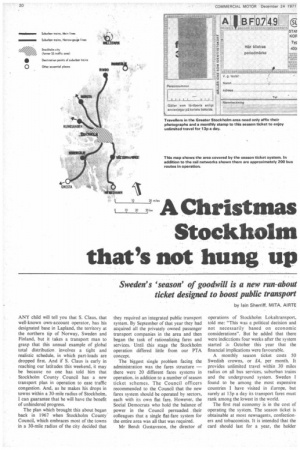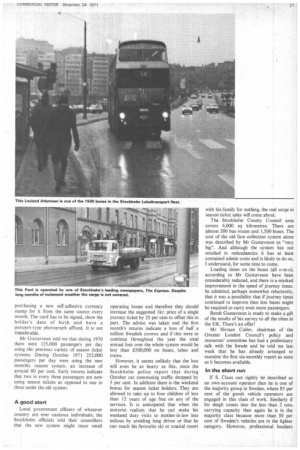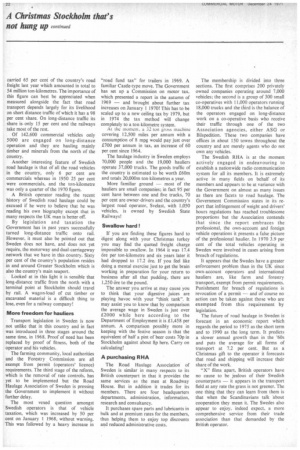A Christmas Stockholm that's not hung up
Page 22

Page 23

Page 24

If you've noticed an error in this article please click here to report it so we can fix it.
Sweden's 'season' of goodwill is a new run-about ticket designed to boost public transport
by lain Sherriff. MITA, AIRTE
ANY child will tell you that S. Claus, that well-known own-account operator, has his designated base in Lapland, the territory at the northern tip of Norway, Sweden and Finland, but it takes a transport man to grasp that this annual example of global total distribution involves a tight and realistic schedule, in which part-loads are dropped first. And if S. Claus is early in reaching our latitudes this weekend, it may be because no one has told him that Stockholm County Council has a new transport plan in operation to ease traffic congestion. And, as he makes his drops in towns within a 30-mile radius of Stockholm, 1 can guarantee that he will have the benefit of unhindered progress.
The plan which brought this about began back in 1967 when Stockholm County Council, which embraces most of the towns in a 30-mile radius of the city decided that they required an integrated public transport system. By September of that year they had acquired all the privately owned passenger transport companies in the area and then began the task of rationalizing fares and services. Until this stage the Stockholm operation differed little from our PTA concept.
The biggest single problem facing the administration was the fares structure — there were 20 different fares systems in operation. in addition to a number of season ticket schemes. The Council officers recommended to the Council that the new fares system should be operated by sectors, each with its own fiat fare. However. the Social Democrats who hold the balance of power in the Council persuaded . their colleagues that a single flat-fare system for the entire area was all that was required.
Mr Bendt Gustavsson, the director of operations of Stockholm Lokaltransport, told me: "This was a political decision and not necessarily based on economic considerations". But he added that there were indications four weeks after the system started in October this year that the financial implications were favourable.
A monthly season ticket costs 50 Swedish crowns, or £4, per month. It provides unlimited travel within 30 miles radius on all bus services, suburban trains and the underground system. Sweden I found to be among the most expensive countries I have visited in Europe, but surely at 13p a day its transport fares must rank among the lowest in the world.
The first real economy is in the cost of operating the system. The season ticket is obtainable at most newsagents, confectioners and tobacconists. It is intended that the card should last for a year, the holder
purchasing a new self-adhesive currency stamp for it from the same source every month. The card has to be signed, show the holder's date of birth and have .a passport-type photograph affixed. It is not transferable.
Mr Gustavsson told me that during 1970 there were 135,000 passengers per day using the previous variety of season ticket systems. During October 1971 252,000 passengers per day were using the new monthly season system, an increase of around 80 per cent. Early returns indicate that two in every three passengers are now using season tickets as opposed to one in three under the old system.
A good start
Local government officers of whatever country are ever cautious individuals; the Stockholm officials told their councillors that the new system might incur small operating losses and therefore they should increase the suggested lkr. price of a single journey ticket by 25 per cent to offset this in part. The advice was taken and the first month's returns indicate a loss of half a million Swedish crowns and if this were to continue throughout the year the total annual loss over the whole system would be less than £500,000 on buses, tubes and trains.
However, it seems unlikely that the loss will even be as heavy as this, since the Stockholm police report that during October car commuting traffic dropped by 5 per cent. In addition there is the weekend bonus for season ticket holders. They are allowed to take up to four children of less than 12 years of age free on any of the • services. It is anticipated that when the motorist realizes that he can make his weekend duty visits to mother-in-law less tedious by avoiding long drives or that he can reach his favourite ski or coastal resort with his family for nothing, the real surge in season ticket sales will come about.
The Stockholm County Council area covers 6,000 sq kilometres. There are almost 200 bus routes and 1,500 buses. The cost of the old fare collection system alone was described by Mr Gustavsson as "very big". And although the system has not resulted in redundancies it has at least contained admin costs and is likely to do so, I understand, for some time to come.
Loading times on the buses (all o-m-o), according to Mr Gustavsson have been considerably reduced, and there is a marked improvement in the speed of journey times. he admitted, perhaps somewhat reluctantly, that it was a possibility that if journey times continued to improve then less buses might be required to carry even more passengers.
Bendt Gustavsson is ready to make a gift of the results of his survey to all the cities in the UK. There's an offer!
Mr Horace Cutler, chairman of the Greater London Council's policy and resources' committee has had a preliminary talk with the Swede and he told me last week that he has already arranged to examine the first six-monthly report as soon as it becomes available.
In the short run
If S. Claus can rightly be described as an own-account operator then he is one of the majority group in Sweden, where 85 per cent of the goods vehicle operators are engaged in this class of work. Similarly if his sleigh comes into the less than 2 tons carrying capacity then again he is in the majority class because more than 50 per cent of Sweden's vehicles are in the lighter category. However, professional. hauliers
carried 65 per cent of the country's road freight last year which amounted in total to 54 million ton-kilometres. The importance of this figure can best be appreciated when measured alongside the fact that road transport depends largely for its livelihood on short distance traffic of which it has a 98 per cent share. On long-distance traffic its share isonly 15 per cent and the railways take most of the rest.
Of 142,600 commercial vehicles only 5000 are engaged on long-distance operation and they are hauling mainly timber and minerals from the north of the country.
Another interesting feature of Swedish road haulage is that of all the road vehicles in the country, only 6 per cent are commercials whereas in 1950 25 per cent were commercials, and the ton-kilometre was only a quarter of the 1970 figure.
A British operator reading the recent history of Swedish road haulage could be excused if he were to believe that he was reading his own biography except that in many respects the UK man is better off.
By legislation and taxation the Government has in past years successfully turned long-distance traffic onto rail. However, it must also be pointed out that Sweden does not have, and does not yet require, the motorway and dual-carriageway network that we have in this country. Sixty per cent of the country's population resides in and around Greater Stockholm which is also the country's main seaport.
Looked at in this light it is sensible that long-distance traffic from the north with a terminal point at Stockholm should travel by rail. A wagon-load of cut timber or excavated material is a difficult thing to lose, even for a railway company!
More freedom for hauliers
• Transport legislation in Sweden is now not unlike that in this country and in fact was introduced in three stages around the same time, in 1968. Proof of need has been replaced by proof of fitness, both of the operator and his vehicles.
The farming community, local authorities and the Forestry . Commission are all exempt from permit (operators' licence) requirements. The third stage of the reform, which is the removal of rate controls, has yet to be implemented but the Road Haulage Association of Sweden is pressing the Government to implement it without further delay.
The most vexed question amongst Swedish operators is that of vehicle taxation, which was increased by 50 per cent on January I 1968, without warning. This was followed by a heavy increase in "road fund tax" for trailers in 1969. A familiar Castle-type move. The Government has set up a Commission on motor tax, which presented a report in the autumn of 1969 — and brought about further tax increases on January 1 1970! This has to be scaled up to a new ceiling tax by 1979, but in 1974 the tax method will change completely to a ton-kilometre system.
Althe moment. a 32 ton gross machine covering 12,500 miles per annum with a consumption of 8 mpg would pay just over £700 per annum in tax, an increase of 60 per cent since 1964.
The haulage industry in Sweden employs 70,000 people and the 19,000 hauliers operate 37,000 trucks. The goods traffic of the country is estimated to be worth £60m and totals 20,000m ton-kilometres a year.
More familiar ground — most of the hauliers are small companies; in fact 95 per cent have between one and five trucks, 70 per cent are owner-drivers and the country's largest road operator, Svelast, with 1,050 vehicles, is owned by Swedish State Railways!
Swallow hard !
If you are finding these figures hard to digest along with your Christmas turkey you may find the quoted freight charge impossible to swallow. In 1964 it was 17.4 Eire per ton-kilometre and six years later it had dropped to 17.2 ore. If you feel like doing a mental exercise just to get the brain working in preparation for your return to business after all that pudding, there are 1,250 ore to the pound.
The answer you arrive at may cause you to think that your digestive juices are playing havoc with your "think tank". It may assist you to know that by comparison the average wage in Sweden is just over £2000 while here according to the Department of Employment it is £1,458 per annum. A comparison possibly more in keeping with the festive season is that the equivalent of half a pint of beer costs 70p in Stockholm against about Sp here. Carry on calculating!
A purchasing R HA
The Road Haulage Association of Sweden is similar in many -respects to its British counterpart in that it provides the same services as the men at Roadway House. But in addition it trades for its members. There are four headquarters departments. administration, information, research and consultancy.
It purchases spare parts and lubricants in bulk and at premium rates for the members, thus helping them to enjoy top discounts and reduced administrative costs. The membership is divided into three sections. The first comprises 200 privately owned companies operating around 7,000 vehicles; the second is a group of 300 small co-operatives with 11,000 operators running 18,000 trucks and the third is the balance of the operators engaged on long-distance work on a co-operative basis who receive their traffic through one of the two Association agencies, either ASG or Bilspeclition. These two companies have offices in about 150 towns throughout the country and are merely agents who do not own any vehicles.
The Swedish RHA is at the moment actively engaged in endeavouring to establish a nationwide radio communication system for all its members. It is extremely active in many fields on behalf of its members and appears to be at variance with the Government on almost as many issues as there are facets to road haulage. The Government Commission states in its report that infringement of weight and drivers' hours regulations has reached troublesome proportions but the Association contends that since the report embraces the professional, the own-account and foreign vehicle operations it presents a false picture of the professional haulier. In 1970 3.9 per cent of the total vehicles operating in Sweden were involved in cases arising from breach of regulations.
It appears that the Swedes have a greater enforcement problem than in the UK since own-account operators and international hauliers are, like farm and forestry transport, exempt from permit requirements. Punishment for breach of regulations is revocation of a permit — and of course no action can be taken against those who are exempted from this requirement by legislation.
The future of road haulage in Sweden is forecast in an economic report which regards the period to 1975 as the short term and to 1990 as the long term. It predicts a slower annual growth than in the '60s and puts the average for all forms of transport at 7.2 per cent. But as a Christmas gift to the operator it forecasts that road and shipping will increase their share of the work.
"X" films apart, British operators have no cause to be jealous of their Swedish counterparts — it appears in the transport field at any rate the grass is not greener. The one thing that they can learn from them is that when the Scandinavians talk About cooperation they mean it. The Swedes also appear to enjoy, indeed expect, a more comprehensive service from their trade association than that demanded by the British operator.




































































